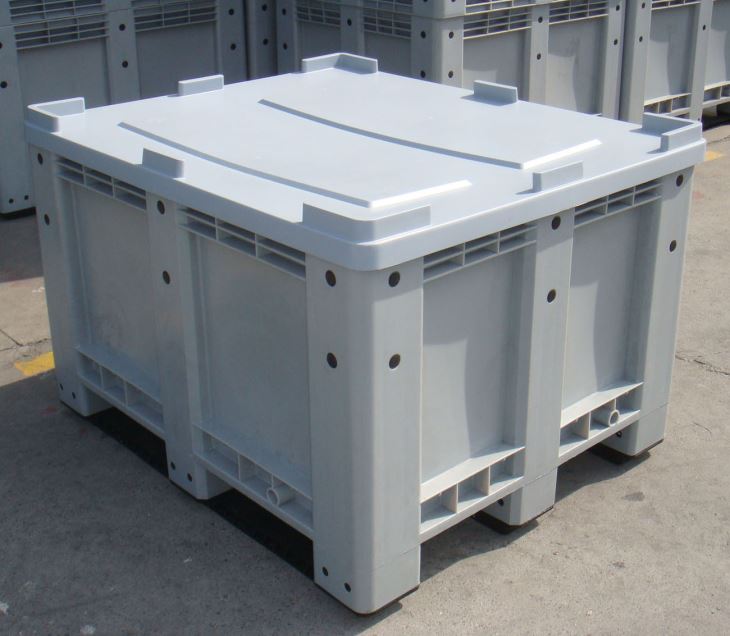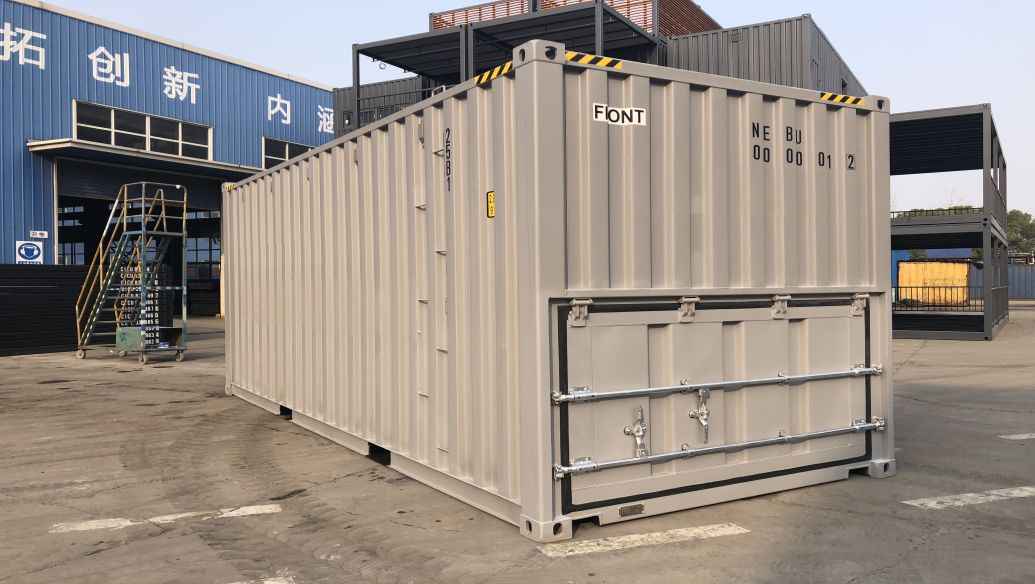Compare refurbished bulk containers and used bulk containers for cost-saving solutions
Wiki Article
The Ultimate Guide to Selecting the Right Bulk Containers for Your Business Requirements
Choosing the proper mass containers is vital for any service that counts on effective logistics. Different sorts of containers exist, each created for particular products and applications. Elements such as size, product compatibility, and regulatory criteria play a considerable function in this decision-making process. Comprehending these aspects can bring about boosted operational efficiency. Nevertheless, numerous businesses neglect vital facets that could enhance their general effectiveness and sustainability. What are these considerations?Comprehending Various Kinds Of Bulk Containers
Bulk containers work as essential tools for companies looking for reliable storage space and transportation remedies. These containers come in different types, each created to satisfy certain operational demands. One typical type is the intermediate bulk container (IBC), which is optimal for granulated and liquid products, supplying a balance of capability and ability to move. An additional preferred option is the bulk bag, or FIBC, ideal for completely dry, flowable products. These adaptable containers are light-weight and can be quickly transported and stored. For heavier products, stiff mass containers are commonly used, offering sturdiness and security for secure handling. Furthermore, there are specific containers tailored for harmful materials, making sure conformity with safety regulations. Comprehending the distinct qualities of these mass container types allows organizations to make informed decisions that enhance logistics and decrease expenses. By picking the right container, companies can improve their operational effectiveness and improve their supply chain procedures.Trick Product Considerations for Mass Containers
When picking mass containers, it is necessary to contemplate the materials utilized in their building. Factors such as chemical, sturdiness, and strength compatibility play a crucial function in making sure the containers meet details functional demands. In addition, weight and portability concerns can affect both performance and transport logistics.Material Sturdiness and Strength
Toughness and strength are essential consider selecting products for mass containers, as they straight affect the container's ability to withstand various ecological conditions and taking care of procedures. Materials such as high-density polyethylene (HDPE), polypropylene, and stainless steel are generally favored for their durable properties, supplying resistance to abrasion, temperature, and influence fluctuations. The selection of material also affects the overall lifespan of the container; stronger materials typically cause less frequent replacements, bring about set you back savings with time. Additionally, the weight of the material can impact shipping costs and simplicity of handling. Businesses should consider their particular functional atmospheres and the potential for deterioration to guarantee peak resilience and toughness in their mass container option.Chemical Compatibility Factors
Recognizing chemical compatibility is essential for picking bulk containers, as the products made use of have to resist the particular compounds they will hold. Numerous aspects influence compatibility, consisting of the chemical nature of the contents, temperature level, and duration of storage. As an example, corrosive chemicals might require containers made from stainless-steel or specialized plastics that resist destruction. Furthermore, responsive compounds can produce warmth or gases, necessitating vented or pressure-rated containers. The selection of container product, whether polyethylene, polycarbonate, or metal, need to straighten with the chemical properties of the stored materials to avoid leakages or violations. Ultimately, a complete evaluation of these compatibility elements ensures risk-free handling and storage space, safeguarding both workers and the atmosphere while keeping item honesty.Weight and Transportability Problems
Picking bulk containers includes not just assessing chemical compatibility but also considering weight and mobility. Companies have to analyze the ease of handling and transport to enhance effectiveness. Light-weight materials like high-density polyethylene (HDPE) or light weight aluminum can assist in much easier motion and lower shipping prices. Alternatively, larger containers may offer improved toughness however can prevent mobility, especially in settings needing constant moving. Furthermore, the design of the container need to permit for convenient training and stacking, guaranteeing ergonomic safety for workers. Firms need to additionally consider the framework readily available for transportation; as an example, containers compatible with forklifts or pallet jacks can streamline operations. Inevitably, the right equilibrium between weight and mobility directly affects functional effectiveness and expense efficiency.Sizing Your Bulk Containers for Optimum Efficiency
When sizing mass containers, businesses must thoroughly evaluate the dimensions needed to suit their specific items. Furthermore, weight ability is an important factor that affects effectiveness and safety and security during transport and storage space. Effective sizing not only optimizes space yet likewise enhances operational operations.Identifying Container Capacities
Choosing the ideal dimensions for bulk containers is important for taking full advantage of effectiveness in storage and transportation. Businesses should evaluate their specific requirements, thinking about variables such as available room, the nature of the items being kept, and the techniques of transportation used. Exact dimensions guarantee that containers fit ideally in storehouses and automobiles, decreasing wasted room and decreasing taking care of time. Criterion dimensions can offer ease, but personalized dimensions could be needed for unique demands or to suit details items. In addition, it is very important to evaluate stacking capacities and availability, as these variables influence general operational performance. Eventually, the ideal measurements cause enhanced organization and streamlined logistics, profiting the general performance of the organization.Weight Capability Considerations
Comprehending weight capacity is vital for services intending to maximize their mass container effectiveness. The weight capacity of a container directly affects storage space capabilities, transport logistics, and general operational expenses. Choosing containers with the ideal weight restrictions guarantees that services can securely save and transfer their goods without running the risk of damages or conformity problems. Overloading containers can result in structural failures, while underutilizing ability results in thrown away resources. It is essential for businesses to examine their item weights and think about any regulative needs when selecting containers. In addition, factors such as the sort of material, intended use, and environmental problems must additionally affect weight capability choices. By reviewing these elements, services can improve effectiveness and assure a structured supply chain.Regulatory Conformity and Safety Specifications

Governing conformity and additional hints safety standards play a crucial duty in the choice of bulk containers for businesses. Organizations must assure that their containers fulfill numerous guidelines set by regional, nationwide, and international authorities. These standards typically concern material security, structural stability, and correct labeling, which help avoid accidents and guarantee the secure transportation of items.
Furthermore, adherence to industry-specific standards, such as those from the Fda (FDA) or the Occupational Safety And Security and Wellness Administration (OSHA), is vital for companies handling unsafe materials or foodstuff. Non-compliance can cause penalties, legal concerns, or damage to a service's track record.
Organizations should likewise consider the container's compatibility with the materials being saved or transported to avoid contamination or chain reaction (used collapsible containers). To sum up, recognizing and applying governing conformity and safety and security criteria is necessary for the accountable and effective use bulk containers
Sustainability Choices for Eco-Friendly Mass Containers

Business are likewise exploring alternatives made from recycled products, which not only preserve check it out sources but also sustain the recycling industry. Developments in style permit for lighter containers that need much less energy to transportation, further boosting sustainability. By incorporating these environment-friendly bulk container options, services can demonstrate their commitment to ecological stewardship while satisfying customer need for lasting practices. This shift not just aids the world yet can also boost brand name credibility and customer commitment.
Cost-Effectiveness and Budgeting for Mass Containers
While numerous organizations concentrate on sustainability, cost-effectiveness continues to be an important variable when picking bulk containers. Organizations must evaluate the initial purchase cost, along with long-term functional expenses, to guarantee monetary feasibility. Factors such as durability, reusability, and upkeep play a considerable function in identifying total expenses.Purchasing top quality containers might yield greater in advance costs however can cause cost savings through lowered replacement rates and lowered waste. Additionally, businesses must consider transport prices and storage space efficiency, as these can impact the total spending plan.

Frequently Asked Questions
Exactly how Do I Determine the Right Container for Hazardous Products?
To establish the best container for unsafe products, one must examine compatibility with the material, consider the container's material, check for regulative compliance, and analyze capacity and safety and security functions to ensure correct handling and storage.Can Mass Containers Be Customized for Particular Products?
Yes, bulk containers can be personalized for certain products. used plastic containers. Numerous attributes, such as material, layout, and dimension, can be customized to fulfill unique demands, ensuring suitable security and efficiency for moving and saving different goodsWhat Is the Typical Life Expectancy of Different Bulk Container Kind?
The average life-span of bulk container types varies; plastic containers last 5-10 years, metal containers 10-20 years, and wooden containers typically last 3-7 years, depending on usage, maintenance, and environmental problems.Just how Should I Tidy and Maintain Mass Containers?
To cleanse and preserve bulk containers, one need to on a regular basis evaluate for damages, remove residue, laundry with suitable cleaning agents, wash thoroughly, and assurance appropriate drying before storage space. Following maker guidelines enhances long life and safety and security during use.Are There Rental Choices for Bulk Containers Available?
Yes, many firms provide rental choices for mass containers, offering adaptability for helpful resources services. These leasings can suit various requirements, enabling firms to handle inventory effectively without the commitment of acquiring containers outright.Durability and toughness are important aspects in selecting products for mass containers, as they directly affect the container's ability to withstand various environmental conditions and taking care of processes. Understanding chemical compatibility is crucial for picking mass containers, as the products utilized should stand up to the certain compounds they will certainly hold. Understanding weight capability is vital for organizations intending to maximize their bulk container effectiveness. Regulative conformity and safety requirements play a crucial role in the choice of bulk containers for companies. While lots of organizations concentrate on sustainability, cost-effectiveness continues to be a critical factor when picking mass containers.
Report this wiki page